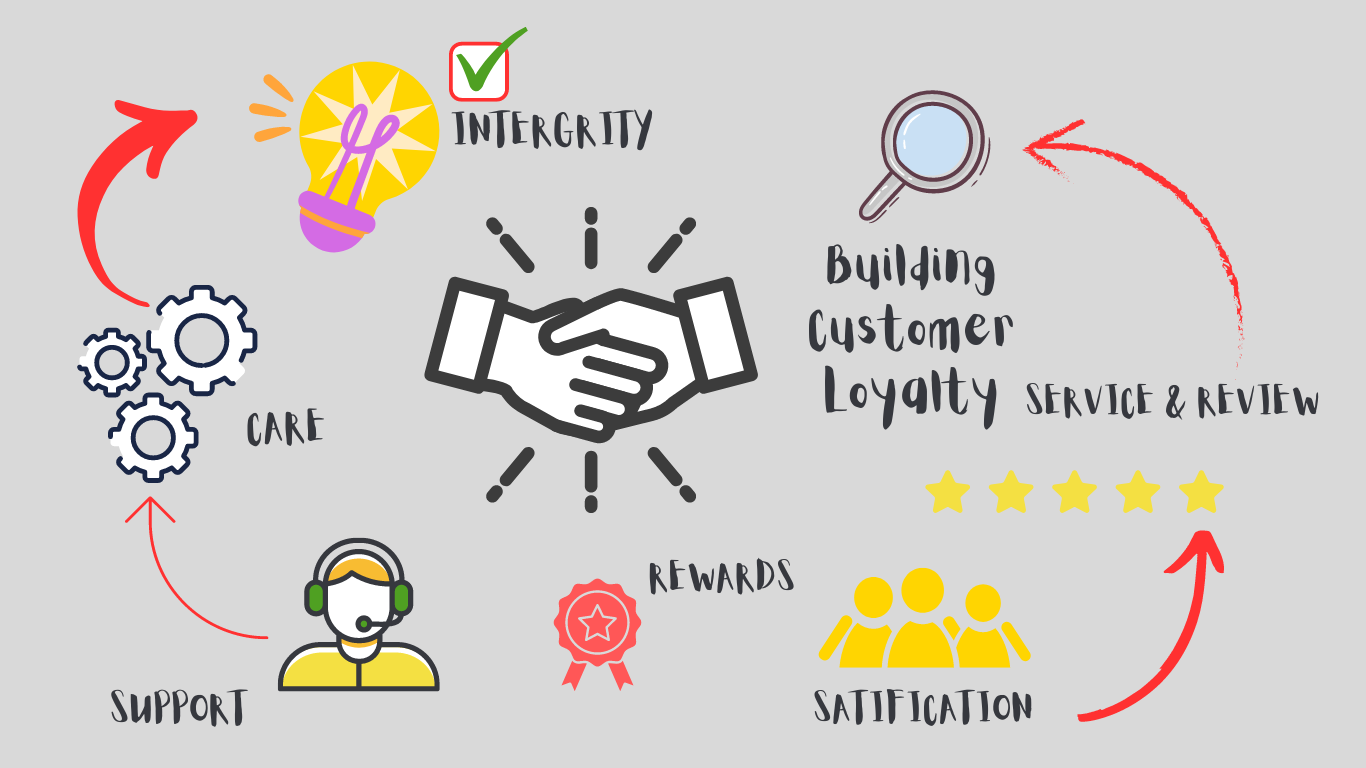Building Customer Loyalty and Long-Term Relationships

16 August 2023
Welcome to our blog, where we dive into the world of business and uncover strategies that can take your company to new heights! In today’s fast-paced market, building customer loyalty is not just a nice-to-have, it’s a necessity. With competition lurking around every corner, businesses must prioritize creating long-lasting relationships with their customers in order to thrive.
Whether you’re an established brand or just starting out, understanding the importance of customer loyalty is paramount. It goes beyond simply attracting new customers; it’s about nurturing existing ones and turning them into raving fans who keep coming back for more. We explore how to building Customer loyalty and build those all-important long-term relationships for your business!
But first things first: What exactly do we mean by “customer loyalty”?
Defining customer loyalty
Defining customer loyalty is like capturing lightning in a bottle – it’s an elusive concept that can vary from one business to another. At its core, customer loyalty refers to the level of commitment and emotional connection customers have towards a particular brand or company.
It goes beyond mere satisfaction with a product or service; it’s about fostering trust, building rapport, and creating an experience that keeps customers coming back for more. It means having loyal customers who not only choose your business over competitors but also advocate for you within their networks.
Customer loyalty is built on a foundation of positive experiences, exceptional customer service, consistency in delivering value, and aligning with the values and aspirations of your target audience. It’s about going above and beyond to exceed expectations at every touchpoint along the buyer journey.
In today’s digitally-driven world where options are abundant and competition fierce, gaining customer loyalty has become more challenging than ever before. However, when achieved successfully, it can be a game-changer for businesses – leading to increased profitability through repeat purchases, referrals from satisfied customers, and reduced marketing costs.
So how exactly do you go about building this coveted sense of loyalty? Let’s explore some proven strategies in the next section!
Why customer loyalty is important
Customer loyalty is a crucial aspect for businesses to thrive in today’s highly competitive market. It goes beyond just having customers who make repeat purchases. Customer loyalty means building a strong emotional connection with your target audience, which leads to long-term relationships and ultimately, sustained success.
When customers are loyal to your business, they not only continue to purchase from you but also become brand advocates. They recommend your products or services to their friends and family, helping you expand your customer base organically. This word-of-mouth marketing is incredibly valuable as it builds trust and credibility among potential new customers.
Furthermore, loyal customers tend to be less price-sensitive compared to new or occasional buyers. They are willing to pay a premium for the quality and value they perceive in your offerings. This can significantly boost profitability and help you invest more resources into product development or customer service enhancements.
In addition, cultivating customer loyalty reduces the costs associated with acquiring new customers. It is estimated that acquiring a new customer can cost five times more than retaining an existing one. By focusing on building strong relationships with current clientele, businesses can save money and allocate those resources towards improving overall customer experience.
Moreover, loyal customers provide invaluable feedback that helps refine products or services over time. Their insights enable businesses to stay ahead of competitors by continuously adapting their offerings based on evolving consumer needs and preferences.
Prioritizing customer loyalty sets the foundation for sustainable growth in any industry. By nurturing long-lasting relationships built on trust and exceptional experiences, businesses create a solid base of repeat customers who contribute significantly to revenue generation while promoting positive brand awareness through advocacy.
How to build customer loyalty
Building customer loyalty is essential for the long-term success of your business. It’s not enough to simply attract new customers; you need to focus on retaining them as well. So, how can you build customer loyalty?
First and foremost, provide exceptional customer service. Treat your customers with respect and go above and beyond to meet their needs. Respond promptly to inquiries or concerns, and always strive for a positive interaction.
Another important aspect is personalization. Tailor your products or services to fit the specific needs of your customers. Offer personalized recommendations based on their preferences or previous purchases.
Regular communication is also key in building loyalty. Stay in touch with your customers through newsletters, social media updates, or personalized emails. This helps keep your brand top-of-mind and shows that you value their continued support.
Furthermore, consider implementing a rewards program or exclusive discounts for loyal customers. This incentivizes repeat business and makes customers feel appreciated.
Don’t underestimate the power of feedback! Listen actively to what your customers have to say about their experiences with your business and use this information to improve and grow.
By following these strategies consistently over time, you will be able to build strong relationships with your customers that foster loyalty and drive long-term success for your business.
Maintaining long-term customer relationships
Maintaining long-term customer relationships is crucial for the success and growth of any business. It goes beyond just making a sale or providing a service – it’s about building trust, loyalty, and a genuine connection with your customers.
One way to maintain these relationships is through consistent communication. Regularly reaching out to your customers shows that you value their business and care about their needs. Whether it’s through email newsletters, personalized messages, or social media engagement, staying in touch keeps your brand top of mind.
Another key aspect of maintaining long-term customer relationships is delivering exceptional customer service. Going above and beyond to solve problems, address concerns, and provide support creates a positive experience that customers won’t forget. By putting the customer first and striving for excellence in every interaction, you can foster loyalty that lasts.
Personalization is also essential when it comes to nurturing long-term relationships with customers. Tailoring your offerings based on their preferences and past purchases shows that you understand their individual needs and are willing to go the extra mile to meet them.
Consistently delivering high-quality products or services builds trust with your customers over time. When they know they can rely on you for consistent results, they are more likely to remain loyal and continue doing business with you.
In conclusion (as requested at the end), maintaining long-term customer relationships requires ongoing effort from businesses. By staying connected through communication channels, providing excellent customer service experiences , personalizing interactions ,and consistently delivering quality products/services – businesses can build strong bonds of loyalty that will benefit both parties in the long run.
The benefits of loyal customers
The benefits of having loyal customers are numerous and can greatly impact the success of your business. First and foremost, loyal customers provide a steady stream of revenue. When someone is loyal to your brand, they are more likely to continue purchasing from you regularly, which can lead to increased sales and profits.
Additionally, loyal customers often act as brand ambassadors for your business. They are more likely to recommend your products or services to their friends, family, and colleagues. This word-of-mouth marketing can be incredibly powerful in attracting new customers and expanding your customer base.
Loyal customers also tend to have a higher lifetime value compared to one-time buyers. They may be willing to spend more money with you over time because they trust your brand and believe in the value it provides.
Moreover, when you have a strong base of loyal customers, it becomes easier to introduce new products or services. Your existing customers already have a positive perception of your brand, making it more likely that they will be receptive to trying out something new.
Building loyalty among your customer base helps create stability for your business. During times of economic uncertainty or market fluctuations, having a group of dedicated customers who continue supporting you can help mitigate any negative impacts on revenue.
In conclusion,
cultivating customer loyalty is essential for long-term success in today’s competitive marketplace.
By focusing on building relationships with our clients
and providing exceptional experiences,
we can reap the many benefits that come with having loyal customers
Case studies of businesses with successful customer loyalty programs
Case Studies of Businesses with Successful Customer Loyalty Programs
1. Starbucks: One of the most well-known examples of a successful customer loyalty program is Starbucks’ My Starbucks Rewards. This program allows customers to earn points for every purchase they make, which can then be redeemed for free drinks and food items. The program also offers personalized offers and promotions based on individual preferences, creating a sense of exclusivity and making customers feel valued.
2. Amazon Prime: Another prime example (pun intended) is Amazon Prime’s membership program. By offering free two-day shipping, exclusive discounts, access to streaming services, and more, Amazon has built a loyal customer base that keeps coming back for more.
3. Sephora Beauty Insider: Sephora’s Beauty Insider program rewards customers with points for every dollar spent, which can be redeemed for deluxe samples or full-sized products from top beauty brands. In addition to this perk, members receive exclusive access to sales events and personalized recommendations based on their past purchases.
4. Zappos VIP Program: Zappos goes above and beyond in providing excellent customer service through its VIP Program. Members enjoy benefits like expedited shipping, 24/7 customer support access, early access to sales events, and even surprise gifts sent directly to their doorstep.
These case studies demonstrate the power of implementing effective customer loyalty programs in building long-term relationships with consumers. By offering valuable incentives tailored to their needs and preferences while providing exceptional service at every touchpoint, these businesses have successfully created loyal followings who continue to choose them over competitors time after time.
Conclusion
Building loyalty and long-term relationships with your customers is crucial for the success of any business. By understanding what customer loyalty means, why it is important, and how to cultivate it, you can create a strong foundation for sustainable growth.
Customer loyalty goes beyond simply making repeat purchases. It involves building trust, providing exceptional experiences, and fostering genuine connections with your customers. This not only leads to increased sales but also creates brand advocates who will spread positive word-of-mouth about your business.
To build customer loyalty, start by focusing on delivering excellent products or services that meet or exceed customer expectations. Offer personalized experiences and rewards programs to show appreciation for their continued support. Listen to feedback and address any concerns promptly.
Maintaining long-term relationships requires ongoing effort and dedication. Stay in touch with your customers through email newsletters or social media updates. Provide valuable content that educates or entertains them while strengthening the connection between your brand and their needs.
The benefits of loyal customers are immense – they are more likely to refer others to your business, spend more per transaction, provide valuable feedback for improvement, and be forgiving when mistakes happen. Investing in customer loyalty pays off in the long run by reducing marketing costs while increasing profitability.
Case studies from successful businesses highlight the impact of effective customer loyalty programs. Companies like Starbucks have built a loyal following through personalized rewards that make each visit feel special. Amazon’s Prime membership program keeps customers coming back with exclusive perks such as free shipping and streaming services.
In conclusion , prioritizing customer loyalty is essential for driving growth in today’s competitive marketplace . By nurturing lasting relationships based on trust , personalization ,and exceptional service , you can create a community of loyal customers who will support your business over the long term . Invest time , resources ,and creativity into cultivating these relationships to ensure sustained success .





